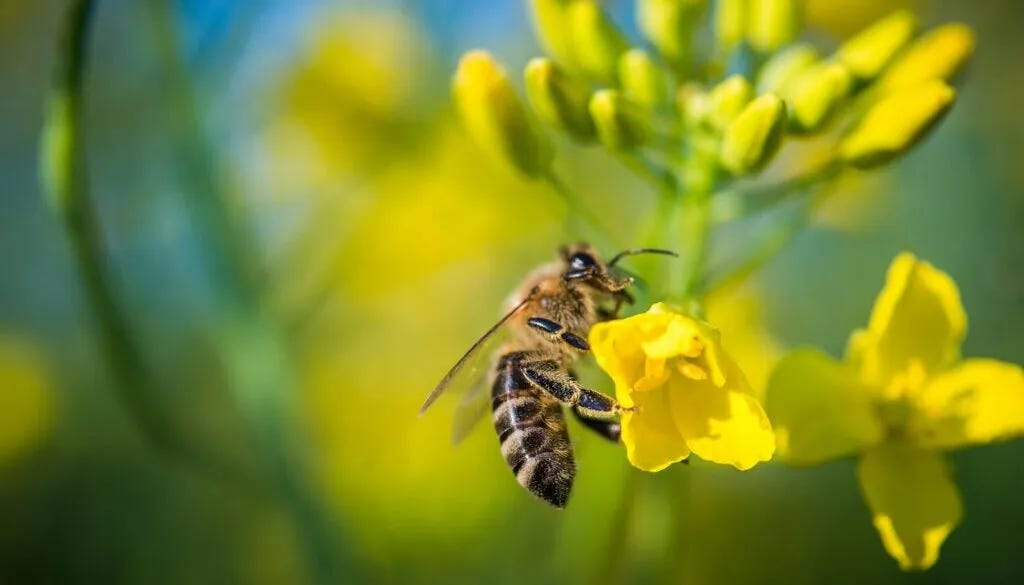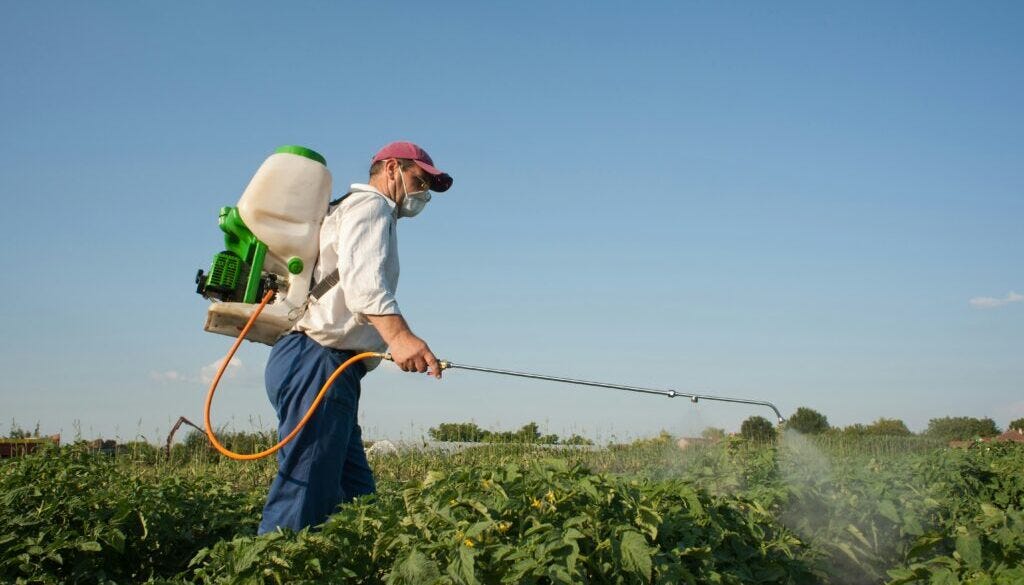Must-read recap: The New Lede's top stories
Roundup trial win overturned; air pollution threatens pollinators; robots in farm fields; EV batteries and PFAS pollution; proposed rule to protect workers from heat; Bayer push to block lawsuits.
Monsanto Roundup trial win overturned by Oregon court
An Oregon appeals court on July 10 overturned a trial victory by Monsanto owner Bayer AG in a decision that adds to an ongoing debate over the company’s efforts to create a nationwide legal and legislative shield from lawsuits alleging Roundup weed killer causes cancer.
The court found that the trial judge in the case improperly barred key evidence about the US Environmental Protection Agency (EPA) from being presented to the jury, which could have led the jury to find in favor of the plaintiff. And, notably, the court rejected arguments by the company that claims about the dangers of its products should be barred because those products carry the EPA’s stamp of approval.
Other courts have similarly rejected so-called “preemption” arguments by Bayer, which bought Monsanto in 2018. But after failing to get court backing, Bayer has been pushing state and federal lawmakers to give it and other pesticide makers the protection the courts have rejected. A proposed measure is being considered by lawmakers for inclusion in the US Farm Bill. Monsanto unsuccessfully argued to the appeals court that the case never should have even gone to a jury because the claims should have been preempted. (Read the rest of the story.)
Air pollution threatens key crop pollinators, study finds
Air pollution jeopardizes bees and other pollinators essential for food production, according to a new study that sheds light on a significant but underrecognized threat to beneficial insects.
In a study published last week in the journal Nature Communications, researchers found that bees, as well as some moths and butterflies, became about a third less efficient at foraging for food, on average, after exposure to elevated air pollution levels. The findings were based on an analysis of data from 120 scientific papers on how 40 types of insects respond to ozone, nitrogen oxides, sulfur dioxide and particulate matter.
“Air pollution is not generally considered as a driver of pollinator declines, but these results indicate that air pollution should be considered as a further factor that is driving pollinator declines,” said James Ryalls, an ecologist at the University of Reading and an author of the study. Declines in pollinator health can translate to declines in crop yields, Ryalls said.
The researchers noted that insects generally seen as harmful to agriculture, such as sap-sucking aphids, did not experience significant declines in their ability to forage from exposure to air pollution. (Read the rest of the story.)
In bid to slash chemical use, robots take on farm fields
Cheney, Kan. – On a sweltering summer day in central Kansas, farm fields shimmer in the heat as Clint Brauer watches a team of bright yellow robots churn up and down the rows, tirelessly slicing away any weeds that stand in their way while avoiding the growing crops.
The battery-powered machines, four feet long and two feet wide, pick their way through the fields with precision. Programmed with myriad data points about the field, the artificial intelligence (AI)-driven bots run without any human hand to guide them.
Brauer, a former California-based tech executive who moved back to his family farm in central Kansas after his father developed Parkinson’s disease, sees the robots as critical tools to help farmers reduce their reliance on chemicals and be more protective of their health and the environment.
His Greenfield agricultural technology company now builds and programs its robots in a shed behind an old farmhouse where his grandmother once lived. Farmers who hire the robots are charged a flat rate per acre weeded. Twenty farmers are signed up for the robotic services this season, and the company hopes to weed 5,000 acres this year.
“The answer is here,” he said. “This solves a lot of problems for farmers.” (Read the rest of the story.)
Electric vehicle batteries adding to toxic PFAS pollution, study finds
A type of toxic PFAS in lithium-ion batteries that power electric vehicles and other electronics is polluting air, soil and water in the United States and Europe, adding to concerns that the growing clean energy sector could harm the environment even as it strives to combat climate change, according to a new study.
Researchers said they analyzed samples of soil, sediment and surface water collected in 2022 near manufacturing plants in Minnesota, Kentucky, Belgium, and France, finding they were commonly contaminated with a subtype of per- and polyfluoroalkyl substances (PFAS) called bis-perfluoroalkyl sulfonimides (bis-FASIs) at concentrations in the parts per billion.
The study, published last week in the journal Nature Communications, also found that bis-FASI emitted into the air at these sites may travel long distances, potentially polluting areas far from the facilities where they are made and used. (Read the rest of the story.)
Proposed rule could protect 36 million workers from hazardous heat
As dangerous heat waves sweep the US, the Biden administration recently announced a first-of-its-kind proposed rule that could help protect about 36 million workers from heat-related deaths and injuries.
If finalized, the safety standard, proposed July 2 by the Department of Labor’s Occupational Safety and Health Administration (OSHA), would require employers to develop plans to address workplace heat hazards and to put in place requirements for rest breaks and access to shade and drinking water.
The announcement came as the Environmental Protection Agency (EPA) released a new report on the impacts of climate change on health and the environment in the US, revealing that almost 1,000 workers died from heat exposure between 1992 and 2022, about one-third of which were construction workers. The report also found that the average number of heat waves increased from two per year in the 1960s to six per year in the 2010s and 2020s. (Read the rest of the story.)
Congress should follow science and reject Bayer push to block lawsuits
(Opinion columns published in The New Lede represent the views of the individual(s) authoring the columns and not necessarily the perspectives of TNL editors.)
Millions of American users of glyphosate-based Roundup have likely assumed the Environmental Protection Agency (EPA) would never have approved the pesticide unless it was safe.
But the science-based truth has never been as cut and dried as the EPA and Bayer, which bought Roundup maker Monsanto in 2018, have made it sound. In a series of trials across the country, juries – and the public – have learned that despite the safety claims by Bayer and the EPA, hundreds of studies by independent scientists link glyphosate herbicides to serious health harms, including cancer.
Even though Bayer maintains that its glyphosate products are safe and not carcinogenic, the company has thus far agreed to pay out more than $10 billion in settlement costs to tens of thousands of glyphosate users suffering from non-Hodgkin lymphoma (NHL), and thousands of lawsuits remain. (Read the rest of the opinion column.)






